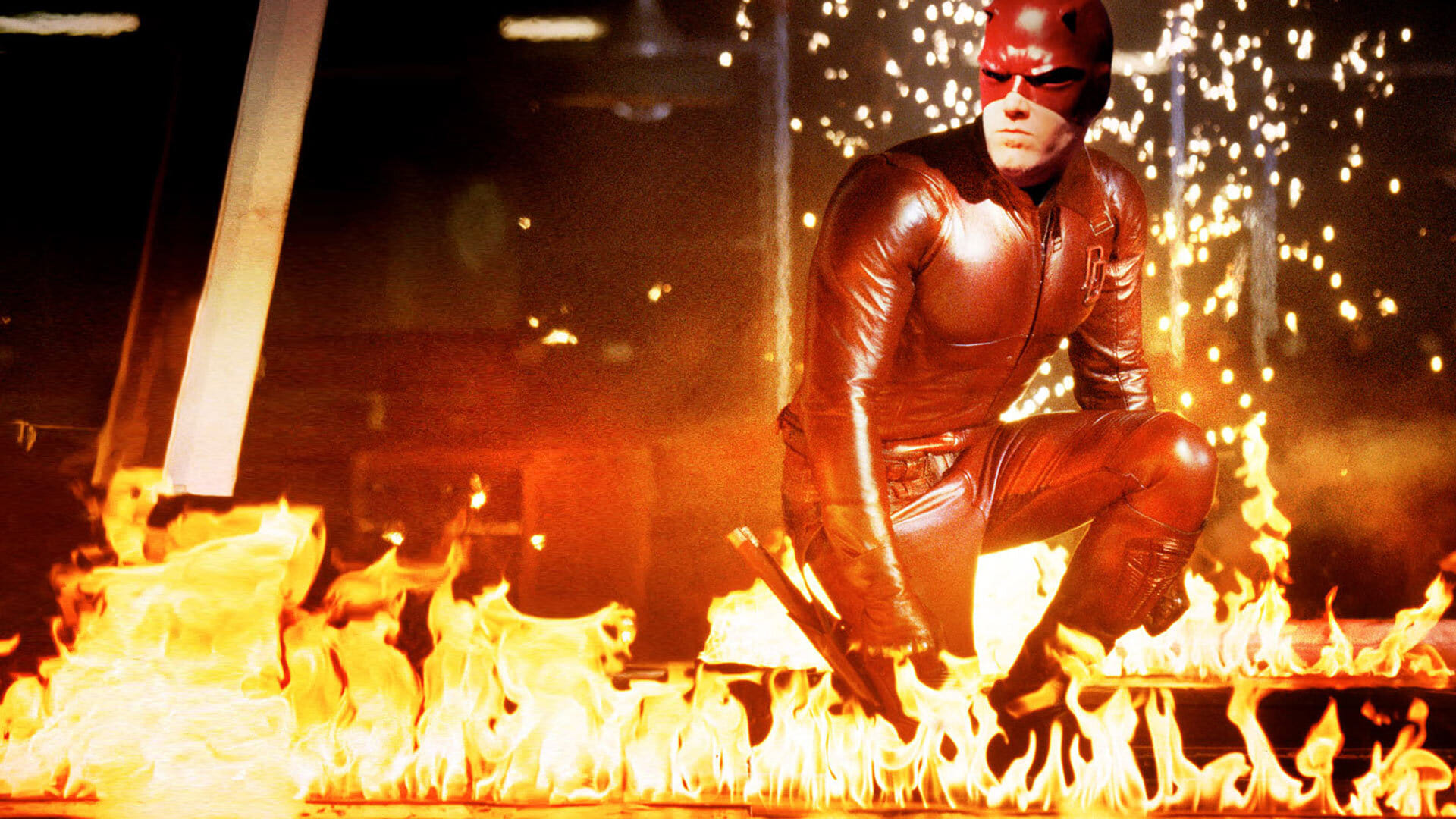February 14, 2003: what better day to release a superhero film about a blind, masked vigilante upon the masses, and indeed, what better day for myself and two friends to line up an hour before the box office opens to secure our tickets? I swear, I didn’t have to blackmail them or anything, they just played along! While I’m sure there was some coercion involved, the fact of that matter is that there would be no pity party involved on this Valentine’s Day, and all that would remain is unabashed excitement for the latest Marvel superhero film. Well, from myself at least, probably not so much the other guys. Following hot on the heels of Spider-Man in 2002 and X-Men the year before, it’s easy to see how anyone with a familiarity with these characters would be excited for any of the Marvel films at this time: around the corner we were getting X2 and Hulk, all in one year!
Unfortunately, that excitement was quickly dashed, as the three of us walked out of the theatre quietly, at which point a wall of denial had built itself within my head and yes, I had decided that I had enjoyed the film. Even revisiting the film now, I’m willing to brush aside many of the issues and come up for reasons why things didn’t work, but mostly, I would just focus on what did work. As I tried to take notes on this viewing, I gave up quickly and threw myself into despair as I came to terms that Daredevil just wasn’t very good. Are there worst Marvel films? Most definitely.
In terms of my comic collecting days, Daredevil is a title that I would dabble in every so often, but my interest for the character would take formation in the four issue mini-series by writer Frank Miller and artist John Romita Jr simply entitled Man Without Fear. The series was a retelling of Matt Murdock’s origin, going into detail on his life as a youth, the accident that gave him his powers, and honing his abilities in the face of anger and dealing with his father’s death. Armed with that piece of work in mind, I went into Daredevil with certain expectations and while the movie may have taken some cues from the series, it did not do it justice, but I do commend that there was some effort put into place. Consequently, the best part of the film might be the beginning, when Matt is a child and explores his relationship with his father, although even with this it’s a tad short and at the time (in 2003) felt too similar to the previous summer’s Spider-Man, and to be fair, death of a parent, or parents, is a fairly common superhero origin.
What we miss out on his young Matt dealing with his newfound abilities, and his attempts to curb his rage: Matt/Daredevil has always been serious and in desperate need of anger management. Fortunately, Netflix’s Daredevil television series would give us what we need and with the breathing room of 10+ hours in each season, fully explore these themes while giving us some decent story to chew on. Affleck’s Daredevil feels like a broken soul, one who is tired and wants to escape: he’s frustrated, but not exactly angry. When he puts the mask on, he turns rather sadistic, and I’m actually taken aback with the level of violence in this film, which feels out of place when put up against the more outlandish and cartoony movement most notably present in his quick travels through alleys and across rooftops.
Colin Farrell’s Bullseye is a highlight of the film, but again, I found myself scoffing at some of the absurdity in his introduction and motives. It seems like it would have been more effective to see Daredevil in more action scenes and exhibiting his abilities, then run up against Bullseye like a surprising brick wall. Throwing Elektra into the mix feels a bit much, as she seems to serve as redundant motivation for Matt to exact revenge upon his father’s killer (who now not only killed his father, but his love interest). Their relationship feels rushed and you realize the movie is trying to fit entirely way too much into the runtime.
With that, I was intrigued that there is an extended cut of the film, so I was eager to watch this version in belief that it might help alleviate some of the issues with the film. Alas, it does not. There is more content but not more expansion of the relationships between these characters, nor any real growth for any of them. We do get more violence, some added swears and even a moment of partial nudity: all a bit surprising for a Marvel film but again, these elements were all upstaged by the television series over a decade later. There’s also an entirely new storyline in the longer cut, involving Murdock and Foggy in their defense of an accused murderer played by Coolio; while it was nice to see more of secret identity at work, I can’t help but feel Affleck’s Matt Murdock to be of little interest on screen. Jon Favreau is a bright spot amongst the cast in his portrayal of Foggy Nelson, who brings some much needed levity to the brooding film.
